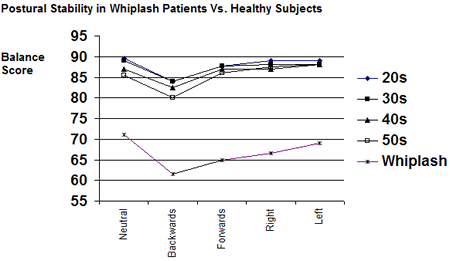Dizziness and vertigo are common symptoms of whiplash injuries. The issue of posture control is a relatively new area of study in the field of whiplash injuries, but one that is providing many new clues into the nature of such injuries. Because postural control is such a complex mechanism, much can be learned about the nature of whiplash injuries if we can understand what aspects of the postural control system are altered after an injury.
There are three components to the Postural Control System:
- The Visual System provides information to the brain on where the body is positioned in space.
- The Vestibular System consists primarily of the inner ear, and provides information to the brain on the motion of the head.
- The Somatosensory portion of the PCS informs the brain of the position of the body. Organs and receptors in the muscles and joints of the body perform this function, which is commonly referred to as "proprioception."
Most of the research on the problem of dizziness after whiplash has been focused on proprioceptive dysfunction. Injury to proprioceptors in the cervical spine could lead researchers to understand exactly what kind of injury mechanism is responsible for whiplash pain and symptoms.
The goal of this current study was to see if there was a difference in balance between healthy subjects and patients with neck trauma. The researchers performed postural stability tests on 32 healthy subjects (no neck complaints or reports of vertigo), and ten whiplash patients. None of the subjects were told the purpose of the study. The healthy subjects were divided into five groups, by age (20s, 30s, 40s, and 50s).
The graph on the following page shows the results between the five groups of subjects.
The researched found two interesting pieces of information. First, all of the subjects had more trouble maintaining balance with the head in the backwards position. Secondly, whiplash patients had significantly reduced postural control functioning.
The authors conclude, "Patients with a whiplash injury and subjective neck complaints have impaired postural control compared with control subjects."
This seems to be a fairly objective test, since the test subjects did not know what was being studied, making it more difficult to "fake" results.
Further research will need to be done to determine the nature of these postural disturbances in whiplash patients.

Kogler A, Lindfors J, Odkvist LM, Ledin T. Postural stability using different neck positions in normal subjects and patients with neck trauma. Acta Otolaryngologica 2000;120:151-155.